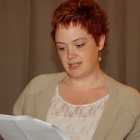“new to you” poetry gong, day 3
W.S. Merwin. Kay Ryan. Charles Simic. I am reading the selections from poets laureate in order (starting with the most recent) as featured in The Poets Laureate Anthology. Today, I am on Charles Simic, another of these honored poets that I had failed to pursue before now. That makes Charles Simic “new to me” and the inspiration for a poem for Day 3 of the “new to you” poetry gong at Big Tent Poetry.
The introduction to Simic talks about his preference for homage to city (instead of nature/country) and his disdain for poetry that is self-centered, lacking reference to — or grounding in — our shared history.
I find the introduction somewhat misleading because it is followed by some of Simic’s love poetry (which I gobbled up even though you know how much I hate love poems and would never in a million years, ahem, write anything resembling one). These poems seem self-centered, which if you know me, you know I don’t mind. Of course, the introduction is likely discussing Simic’s entire body of work and the samples together express his urban sensibility and show the dangers in the world. (It’s also entirely possible that the poems that seem to me about the self contain references to history and culture that I’m just not catching. I feel this way reading a lot of his pieces: the simplicity must surely be deceptive; I must not be astute enough to grab at all the layers.)
I enjoyed the harsh environments he depicts. He is skilled with scene and extended metaphor. Many of the recurring images he uses are very powerful, including coats/overcoats and burning cities, for example. All of the love poems in the book’s selection were simultaneously about sex, a literary pairing which I really dig (I am only slightly ashamed to admit). Almost every line of every poem starts with a capital letter. Many of his line breaks reinforce the spaces between grammatical phrases or natural breath. (Is it because I just read Kay Ryan that I notice that “grammatical” and “natural” sound similar?)
Still, I can’t shake the fact that I am no scholar and that I am missing something. And so when I write today, inspired by Charles Simic, it isn’t going to be by mimicking the tools and devices he uses (as I did with Merwin and Ryan) because I don’t think I “get” his tricks. Except that I know his images are especially vivid.
So today, I am writing inspired by one of his images. It is from the poem “Listen.” It is spectacular. It is gut-punch. Its final, shocking lines are “At the sight of a small child/ Leaping out of a window/ With its nightclothes on fire.” I am struck not just by the surprising and tragic image, but by the use of “its” as a modifier instead of “his” or “her.” I don’t know if it is simply a decision based on grammar or if the selection is to purposely make the child an object. It has a lot of power in the later case, and that’s how I read it in his piece. In my poem, I make the child a boy right away.
POEM REMOVED FOR EDITING.
///
Comments are closed.




Beautiful poem, Carolee! Way to run with the prompt.
Thanks, Marie-Elizabeth!
Vivid indeed! I love the lines:
“the soft/Trampolines of their tongues.
Though he is feathered in flames,”
and
“Not one of our sons will be
Recognizable after this war.”
I didn’t get the war connotation until the end, but you have re-inforced my peacenik tendecies with this poignant poem.
It surprised me, too, viv!
Crushing, just horribly beautiful, especially “There are so many//They light up the sky.”
what an amazing poignant poem – “feathered in flames” – a chillingly beautiful image
This is inspired, Carolee. I love it.
Oh, I like this. I think you “got” Simic more than you think.
ohh, that is good very good… the transition of flames and fire, jumping boys…. broken boys… hurry around the block… the images each fold into each other to tell a painful story…
This war poem seems set in soft focus. It kind of numbs and then shocks right at the end.